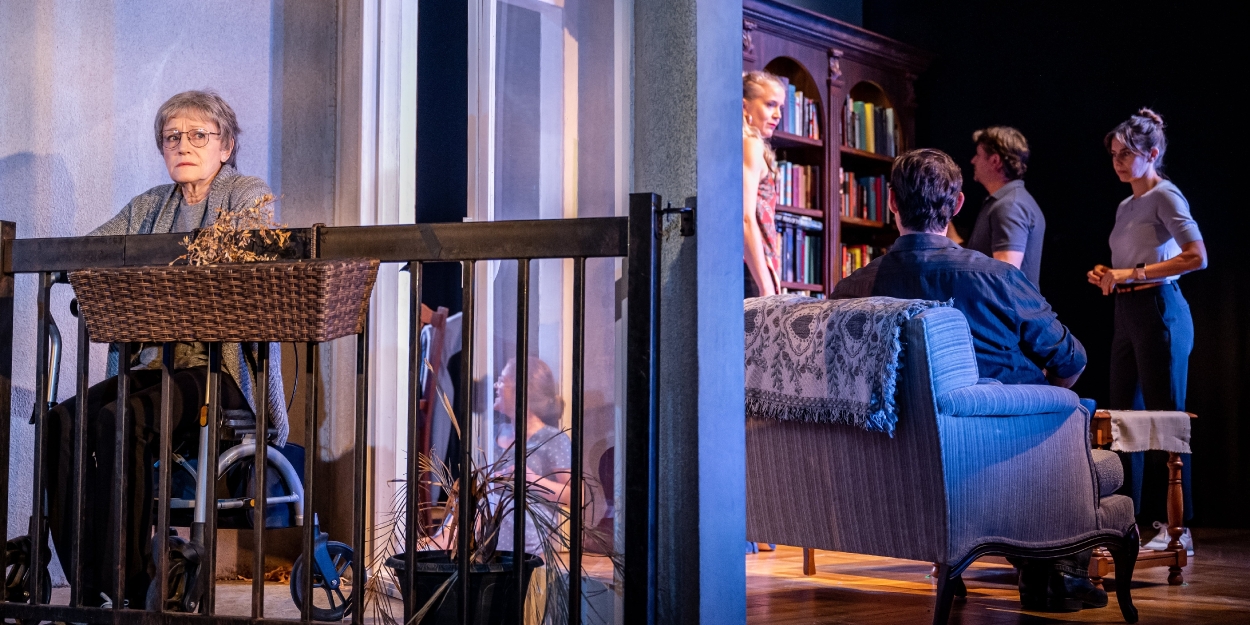Review: PUBLIC ENEMY at Canadian Stage
Conversational chaos in Canadian Stage's assured season-opener

Canadian Stage's PUBLIC ENEMY, which gives Oliver Choinière's script its first English-language production in a translation and adaptation by Bobby Theodore, is a modern dining-room drama where opinions are loudly aired and ignored. Effectively staged by Brendan Healy, with an impressive cast inhabiting its dysfunctional but believable characters, it's like watching a conversation by your most frustrating group of relatives, complete with realistic political and generational clashes of belief.
A Friday night dinner at grandmother Olivia's house (Rosemary Dunsmore) gradually simmers over, as her children, conspiracy theorist James (Jonathan Goad), nervous, uptight Melissa (Michelle Monteith), and overeducated drifter Daniel (Matthew Edison) bicker with her and each other.
Largely confined to the study are James's teenaged son Tyler (Finley Burke) and Melissa's young daughter Olivia (Maja Vujicic), who have their own tension, including a disagreement over a small wild animal that in an entertaining bit of puppetry (built by Sophie Moynan) provides one of the evening's most openly theatrical moments.
Not a lot happens in the play, which is largely buoyed by its free-wheeling conversations, philosophical moments, and disagreements. There's so much talk that the show pulls off the complicated maneuver of overlapping dialogue in a way that is simultaneously understandable and that simulates the mildly disorienting experience of being at an actual family dinner with three separate conversations occurring around you. For a similar effect, a detailed, rotating tripartite set (Julie Fox) occasionally gives us different angles on the same evening, so that we can see scenes from different sides and viewpoints.
Though there is some drama involved in a fight over who is taking advantage of grandma, this is largely a slice-of-life drama, the impact primarily stemming from the characters' inability to fully communicate and the lack of ability to change, grow, and see past themselves.
That's because, at its heart, Public Enemy is about the many faces of agency and the pain its absence can cause. It shows a whole host of philosophies and questionable choices large and small, and offers at their core a common fear of this loss of control, whether it be a lack of mental agency that causes a person to no longer be responsible for his actions, or the physical and emotional indignities faced by both children and aging grandparents as their personhood is ignored in the name of their protection.
This need to be heard and respected has a cascading effect. For example, the tone by which Tyler's father speaks to him drips with contempt, as he humiliates his son over his lack of knowledge and takes away his phone, his main source of communication, telling him to read one of the many older books displayed on the shelf instead. We immediately see the cycle continue as Tyler grabs the channel changer away from Olivia, uninterested in watching the TV, but interested in exerting whatever power he still can.
Everyone gives a strong performance. Goad seems grounded and gruff until he starts talking about banks and the cracks begin to show; his embarrassment over successfully confronting his brother is palpable, especially after his conciliatory gestures are rebuffed. Edison's defense of human rights appeals until it bumps up against his character's pointed flaws, as he selfishly sulks and shuts down. Though Monteith effectively fusses as a vigilant mother, eventually taken to uncomfortable extremes, her role is mostly reactive; it would be nice to see more from her character's point of view. They all show different sides of their personalities with each other, more likely to revert to childish behaviour in the face of mom and her house.
As the younger members in the cast, Burke and Vurjicic give us a believably rocky cousin relationship, frustrations too big for their developing emotional intelligence spilling over into bursts of violence. The star of the evening, however, is Dunsmore, whose soft touch contrasts with her sharp tongue, both connected to her need to assert her status as single mother and family matriarch.
Much like its spirited dinner debate, PUBLIC ENEMY is likely to be a divisive show that sparks a lot of conversation. Unlike an interminable dinner party, however, it's more entertaining than frustrating - plus, you can leave this assured production after 90 minutes.
Photo of Rosemary Dunsmore, Amy Rutherford, Matthew Edison, Jonathan Goad, Michelle and Monteith by Dahlia Katz
Reader Reviews

Videos

